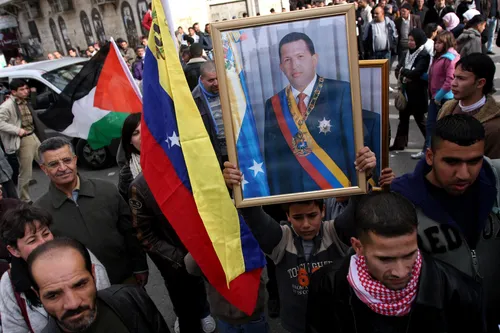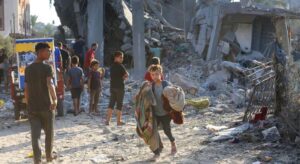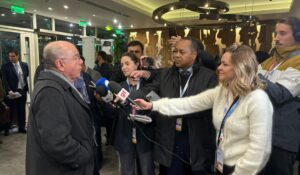
Venezuela’s relationship with Palestine deepened during Hugo Chávez’s presidency. The former Venezuelan leader reinforced support throughout his term and brought the debate closer to the dispute over the recognition of Palestinian sovereignty in South America. But 11 years after his death, Chávez’s position still reverberates among Venezuelans.
The year 2013 represented a rupture for Venezuela. Then-president Hugo Chávez died of cancer at the age of 58 – 12 of them at the head of a process of transformation of the Venezuelan State. Much of his foreign policy was guided by the defense of recognition of the State of Palestine.
Venezuelan journalist and researcher Carlos Durich told Brazil and Fact that Chávez was the president closest to the Palestinian cause in the West.
“Chávez has always had the ability to have empathy and defend the Palestinian State. He was the head of state closest to and most empathetic to the Palestinian process, at least in the West. He even changed the paradigm in relation to the view that was held about the conflict. Before Chávez there was talk of a religious conflict rather than a colonial and imperial conflict. After Chávez this changed and there began to be talk of an imperialist conflict,” he stated.
A mark of this proximity is that Venezuela was the first country on the American continent to recognize the sovereignty of the Palestinian State in 2009. But to reach this moment, Chávez had a political construction that brought him closer to the Palestinian struggle.
According to Durich, there are three ways in which the Venezuelan makes this movement. The first is that, during his studies in History and his master’s degree in Political Sciences, he always admired the historic leader of the Palestine Liberation Organization, Yasser Arafat, and felt close to the thesis that the emergence of the State of Israel is a Zionist project of Western powers.
Another influence was family. When he entered the army, his brother Adán Chávez was active in the Revolutionary Party of Venezuela (PRV), a political organization that shows solidarity with the Palestinian struggle. The third element is that another militant with a lot of influence in his political process was Fernando Soto Rojas, who was a deputy and was part of the Venezuelan guerrilla struggle in the 1960s. He was also linked in the 1970s to the Popular Front for the Liberation of Palestine.
For Chávez, both the process that was underway in Venezuela and the movement to recognize the Palestinian State were anti-colonial struggles. This is one of the main themes that, together with the oil issue, shape Chávez’s proximity to Palestine.
Public statements
The former president spoke out several times against Israel’s actions in the Gaza Strip and the West Bank and was proud that the “revolution has always been on the side of the Palestinian people since day one”.
One of the Venezuelan leader’s first public statements was in 2006, at the Miraflores Palace. After a bombing in the Gaza Strip that killed five children and two women, Chávez said that “for Israel there is no United Nations and there is no international law.”
The year 2009 was fundamental in the relationship between Chávez and Israel. On December 27, 2008, the Israeli Army launched a 25-day attack against Palestine. Around 300 Palestinians died and thousands of buildings were destroyed. Chavez responded. On January 5, 2009, the Venezuelan said that the attack was supported by the United States and that the world should “stand up, just as Venezuela does, for the end of the invasion in Gaza and the death of thousands of innocents”.
Chávez raised his tone the following day. He called the Israeli action a “Palestinian Holocaust”, expelled the then Israeli ambassador to Caracas, Shlomo Cohen, and called for the presidents of Israel and the United States to be tried by the International Court of Justice for the siege and blockade against Gaza. Still according to him, Israel prevented the entry of water and humanitarian aid from the Red Cross.
The rupture of diplomatic relations between Venezuela and Israel was announced that same night by the then Minister of Foreign Affairs, now president, Nicolás Maduro.
On November 27, 2009, Chávez received the president of the Palestinian National Authority, Mahmud Abbas, in Caracas. At the meeting, the Venezuelan reinforced his support for the Palestinian people in the “fight against the Yankee empire and the genocidal State of Israel”. At the time, Palestinians demonstrated in the Gaza Strip and the West Bank holding pictures of the South American president. According to Palestinians interviewed by AFP, Chávez was the only president who defended the Palestinian people at all times.
Chávez maintained his stance of defending the Palestinian people until the end of his term. The following year, he accused the United States of “sponsoring the terrorism of its ally Israel” after the death of a group carrying humanitarian cargo to the Gaza Strip and criticized the “double standards” of the Americans of “condemning terrorist acts except against a of their allies.”
In 2011, then Chancellor Nicolás Maduro delivered a letter to the UN Secretary General, Ban Ki Moon, asking for the recognition of the Palestinian State. The document signed by Chávez also reinforced Palestine’s right to be recognized as a free country and said that the conflict in the region was not religious, but political.
One of Chávez’s last statements on the issue was made in 2012, when the former president called the attacks against the Gaza Strip savage.
According to Durich, Maduro followed Chávez’s line and continues this policy. “Much because of his record as chancellor, as he was part of the conversations between Venezuela and Palestine. He reiterates the complaints against the violence suffered by Palestine”, he states.
Thump for the revolution
Chávez’s death on March 5, 2013 was a blow to the process initiated by the former president himself 12 years earlier. There was great commotion among activists and even opponents stopped to watch the farewell of the then head of the Executive.
Jhonatan Sayago, professor of cultural thought and decolonial development at Simón Rodríguez University, says that the moment the news was given destabilized not only Chávez’s supporters, but the entire Venezuelan society. He remembers that a large part of the population took to the streets to find a way out of that moment of mourning, which collapsed the transport system.
::What is happening in Venezuela?::
“It was a moral blow to the militancy. At that moment, people were really disoriented,” she says. According to the United Socialist Party of Venezuela (PSUV) member, Mary Carmen León Monagas, the impact was profound, but it maintained a legacy in the party’s work.
“It was very painful. It was as if our father had been taken away. It is something that continues to this day. But an oath was made around Chávez’s words, to keep his words alive. There isn’t a day that goes by that we don’t remember him. His legacy in activism is also fundamental in the groundwork done,” he said.
Editing: Lucas Estanislau
Source: www.brasildefato.com.br

